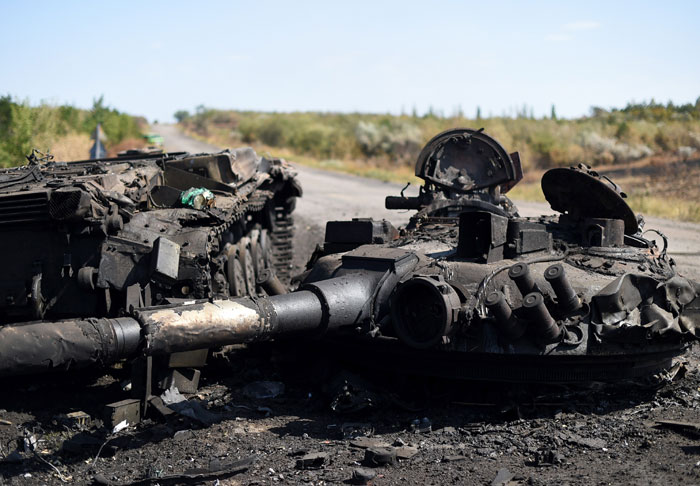A destroyed tank is seen on the road to Ilovaisk, 50 km east of Donetsk, on Wednesday. Ukrainian President Petro Poroshenko announced that he and his Russian counterpart Vladimir Putin had agreed a surprise truce in Ukraine's four-month war with pro-Moscow rebels.
AFP/Moscow
Russian President Vladimir Putin on Wednesday called on both Ukrainian rebels and government forces to cease fire and agree to the broad terms of a truce ending their four-month war.
Putin's first direct appeal on the insurgents to lay down their weapons came hours after the beleaguered Ukrainian president, Petro Poroshenko, said he and Putin had agreed on a ceasefire deal.
The announcements raised hopes of an end to fighting that has killed at least 2,600 people and driven relations between Russia and the West to their lowest ebb since the Cold War.
Putin outlined a seven-point peace plan that included the end "of active offensive operations by the (Ukrainian) armed forces and armed rebel units in the southeast of Ukraine."
The Russian leader added that he expected a final agreement to be announced by the insurgents and Kiev representatives during European-mediated negotiations on Friday in the Belarussian capital Minsk.
Poroshenko's office said the two presidents agreed by telephone on "a permanent ceasefire in Donbass (eastern Ukraine)."
"An understanding was reached concerning steps that will help to establish peace," a statement said.
Putin's appeal to the rebels came in advance of a NATO summit on Thursday at which the Western military bloc is expected to approve a new rapid reaction force for defending eastern Europe.
The Kremlin denies giving more than moral support to the insurgents who began their uprising against Kiev's new Western-backed leaders in April.
But Western powers say Moscow has been orchestrating the war as part of a land grab that started with the annexing by Russian troops of Crimea, a strategic region on the Black Sea, in March.
US President Barack Obama, on a highly symbolic visit to former Soviet republic and new NATO member Estonia, reacted cautiously to initial reports of a ceasefire deal, saying it was "too early to early to tell."
"There is an opportunity here. Let's see if there is a follow up," Obama said.
There was also still doubt over whether pro-Russian rebel commanders who have been routing Ukraine's army in recent fighting would comply.
One rebel representative of the eastern district of Donetsk said the rebels would halt fire only if government forces retreat from eastern cities they had been shelling in recent weeks.
"If Kiev withdraws from towns and cities - and better yet, from the entire territory of the Donetsk People's Republic - then there will be no sense in seeking a military solution to the conflict," Donetsk rebel leader Miroslav Rudenko told Russia's Interfax news agency.
Obama used his Estonia visit to announce the deployment of extra US airforce units to defend the tiny Baltic state's border with Russia.
"Estonia will never stand alone," he said.

